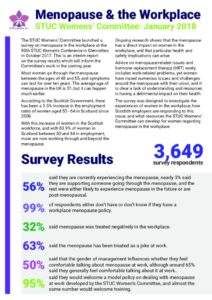
Over 3,500 women responded to the STUC Women’s Committee survey, with over half of participants currently going through the menopause. The survey was launched at their conference in Glenrothes in October 2017.
Sharon Edwards, STUC Women’s Committee Chair, said:
“For far too long the menopause has been an issue shrouded in secrecy, resigned to whispered conversations between women, or jokes about hot flushes, if even discussed at all. What the results of our survey show is that menopausal women are facing some real challenges in the workplace, and that employers are not really sure what to do to best support them. More and more women are working on well into their 50s and 60s so it’s an issue that employers are going to have to look at much more closely.
“It is clear from the survey comments that the ways in which the menopause affects women in the workplace are wide and varied. From not being able to perform at usual levels due to tiredness caused by hormonal induced insomnia to severe bleeding, pain, and discomfort. If these symptoms were as a result of an illness or disease, more often than not measures would be put in place to support the worker to continue to contribute in the workplace. But because the menopause is seen as just something that happens to women, because of the lack of awareness, because of the lack of conversations about what happens to women before, during, and after the menopause, the same considerations are not made, and more often than not women struggle on in silence, managing as best they can.
“The STUC Womens’ Committee is committed to changing this, and our survey was the first step. We are now working with our affiliated trade unions to find examples of good practice with a view to creating a model policy which employers can adapt for their own workplaces. We will also be looking at training and support for workplace reps so they can better support women going through the menopause.
“Trade unions have campaigned for and won many changes that have transformed women’s lives – equal pay, paid maternity leave, paid holidays, and in recent times, free access to sanitary items. We now have our sights set on ensuring that women experiencing the menopause are better supported in the workplace.”
